The Korean Vernacular Story
Telling Tales of Contemporary Chosŏn in Sinographic Writing
Format:Hardback
Publisher:Columbia University Press
Published:21st Aug '20
Should be back in stock very soon

As the political, economic, and cultural center of Chosŏn Korea, eighteenth-century Seoul epitomized a society in flux: It was a bustling, worldly metropolis into which things and people from all over the country flowed. In this book, Si Nae Park examines how the culture of Chosŏn Seoul gave rise to a new vernacular narrative form that was evocative of the spoken and written Korean language of the time.
The vernacular story (yadam) flourished in the nineteenth century as anonymously and unofficially circulating tales by and for Chosŏn people. The Korean Vernacular Story focuses on the formative role that the collection Repeatedly Recited Stories of the East (Tongp’ae naksong) played in shaping yadam, analyzing the collection’s language and composition and tracing its reception and circulation. Park situates its compiler, No Myŏnghŭm, in Seoul’s cultural scene, examining how he developed a sense of belonging in the course of transforming from a poor provincial scholar to an urbane literary figure. No wrote his tales to serve as stories of contemporary Chosŏn society and chose to write not in cosmopolitan Literary Sinitic but instead in a new medium in which Literary Sinitic is hybridized with the vernacular realities of Chosŏn society. Park contends that this linguistic innovation to represent tales of contemporary Chosŏn inspired readers not only to circulate No’s works but also to emulate and cannibalize his stylistic experimentation within Chosŏn’s manuscript-heavy culture of texts.
The first book in English on the origins of yadam, The Korean Vernacular Story combines historical insight, textual studies, and the history of the book. By highlighting the role of negotiation with Literary Sinitic and sinographic writing, it challenges the script (han’gŭl)-focused understanding of Korean language and literature.
Park’s research into No’s linguistic-literary experimentation opens a new path for understanding the multilayered diglossia in Chosŏn literature. It also helps us reflect on issues in Korea today, such as Seoul-centrism, social mobility, and wealth and status. I feel that this, the first monographic work on yadam in a Western language, will appeal not only to specialists of premodern Korea, but to a wide range of readers as well. -- Jeongsoo Shin * Journal of Asian Studies *
Si Nae Park’s The Korean Vernacular Story: Telling Tales of Contemporary Choson in Sinographic Writing offers a new look at the intriguing classical literary genre of yadam. Her thorough study of the late eighteenth-century collection known as Dongpae naksong, or Repeatedly Recited Stories of the East, compiled by No Myeongheum, casts light on the formation and significance of the yadam genre in the literary history of the Joseon period. -- Charles La Shure * Seoul Journal of Korean Studies *
[An] impressively-researched book . . . The Korean Vernacular Story will not only appeal to scholars (there is much here that is analytical and scholarly) but to anyone interested in finding out about Asian writing which is not Chinese or Japanese. * Asian Review of Books *
In The Korean Vernacular Story, Park unfurls a sparkling canvas of eighteenth-century Chosŏn Korea, where new forms of the written vernacular, social mobility, literary sociability—both Seoul- and Beijing-centered metageographies—and vernacular temporalities intersect. A remarkable intervention in Korean studies with crucial implications for the study of East Asia’s Sinographic literatures. -- Wiebke Denecke, author of Classical World Literatures: Sino-Japanese and Greco-Roman Comparisons
The major project in Korean cultural history is to recapture Korea’s hidden vernacular past in the forest of “Chinese” writing by Koreans. Si Nae Park’s reading of the hitherto neglected yadam genre does exactly this, bringing these voices from Chosŏn Korea to life in their original earthy splendor. -- John Whitman, author of Korean: A Linguistic Introduction
In this valuable study of yadam, Si Nae Park deftly handles the tensions between the oral and contemporary origins of the tales and the Sinitic script in which they are inscribed. Park has made a subtle, significant, and lasting contribution to an emerging but important field—the study of vernacularization in East Asia. -- Peter Kornicki, University of Cambridge
The Korean Vernacular Story is a meticulous and compelling reassessment of the emergence of yadam, elaborated through No Myŏnghŭm’s compilation of real-world stories in highly vernacularized Sinitic. This insightful study demonstrates how premodern Korea, its culture increasing influenced by women, came to appreciate and readily circulate stories about itself. -- Sunglim Kim, author of Flowering Plums and Curio Cabinets:The Culture of Objects in Late Chosŏn Korean Art
The first full-length examination of the yadam genre, The Korean Vernacular Story examines the literary and social milieu in late Chosŏn Seoul. Using meticulous research, Park forms arguments that will certainly serve as the foundation for further research. -- Michael J. Pettid, coeditor of Premodern Korean Literary Prose
A rethinking of vernacularity in late Chosŏn, free from modernist assumptions about the relationship between language and text. -- Sixiang Wang * Journal of Korean Studies *
Park’s achievement does not lie merely in her nuanced historicization of the rise of the literary vernacular in eighteenth-century Chosŏn Korea. Her book also powerfully foregrounds the intricacy of the cosmopolitan-vernacular dynamics in a larger sinographic world. . . This is a must-read book for anyone who is interested in Chosŏn literary history and manuscript culture, early modern East Asian literature, and literary Sinitic and local vernaculars in the sinographic world. -- Suyoung Son * Harvard Journal of Asiatic Studies *
The Korean Vernacular Story is indispensable for all scholars dealing with questions of Korean language, literature, or pre-modern societal structures. Furthermore, this book about the telling of stories is itself a wonderful story and, in fact, a delightful read. -- Vladimir Glomb * Acta Koreana *
ISBN: 9780231195423
Dimensions: unknown
Weight: unknown
328 pages